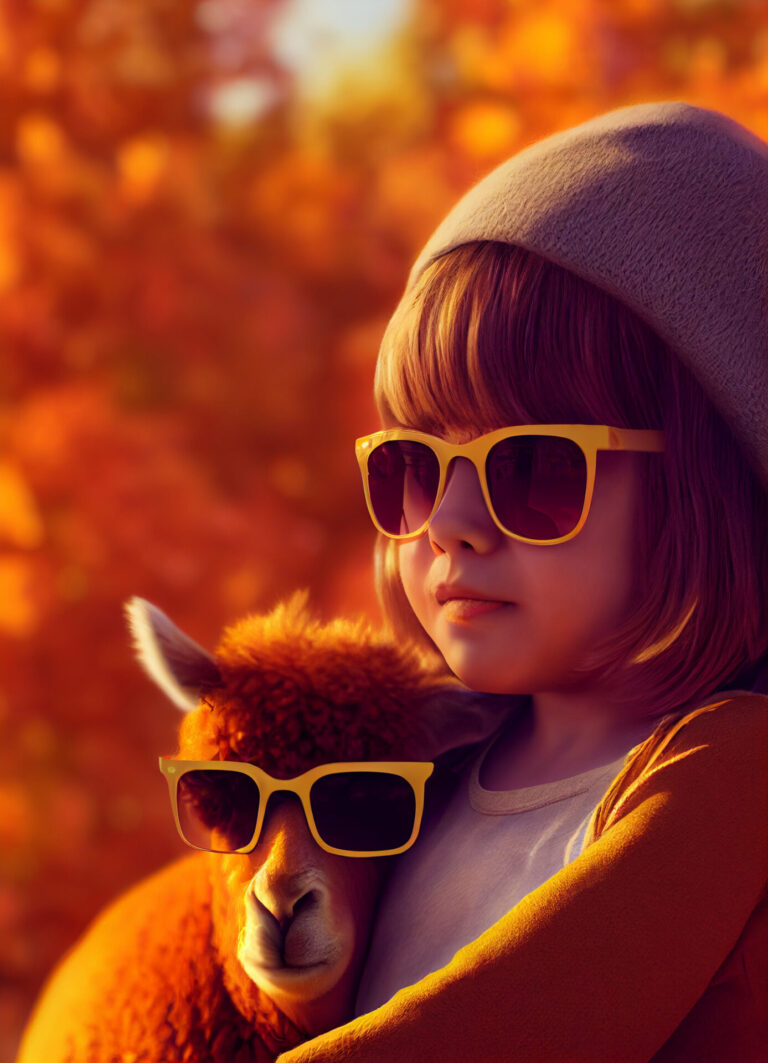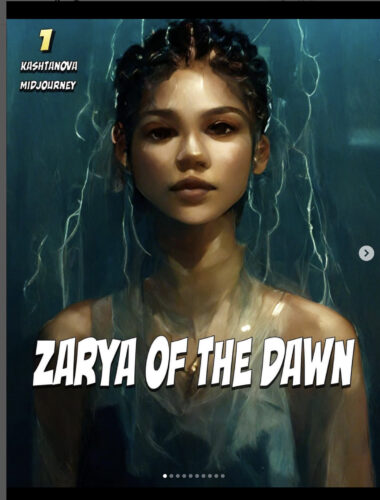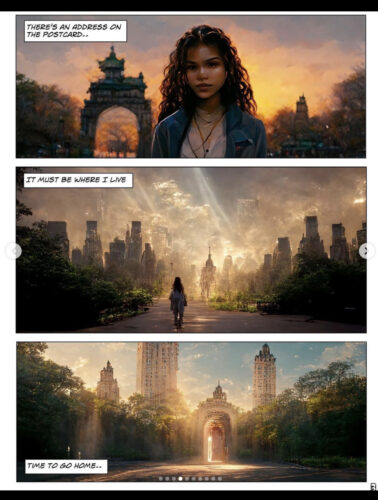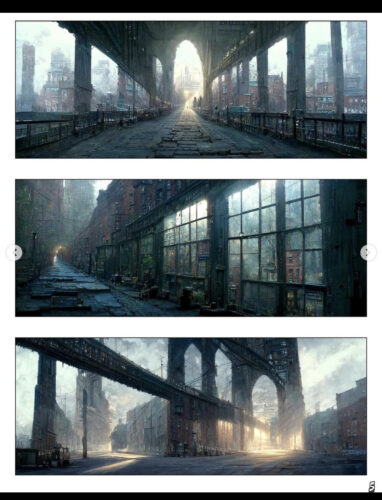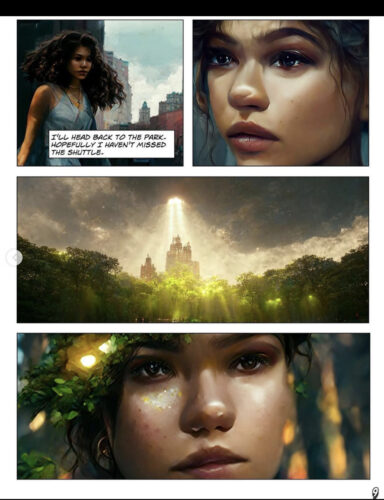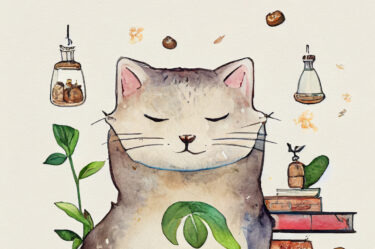There was good news and bad news for AI painters.
The good news is that an artist named Kris Kashtanova (kris.kashtanova) has obtained copyrights from the US Copyright Office for graphic novels created by Midjourney and others.
This is probably a world first.
The bad news is that Getty Images, a U.S. photo imaging agency, has banned the handling of images created by Midjourney, Stable Diffusion, and other image-generating AIs.
The current situation seems to be a collision between the trend of accepting AI images and the trend of not accepting them.
Let's take a closer look below.
AI Art Obtains U.S. Copyright Registration
A New York-based artist by the name of Chris Kashtanova has obtained a U.S. copyright registration for a graphic novel featuring AI-generated artwork, possibly for the first time. Their Instagram feed A public records search by Ars Technica confirmed this.
The registration, effective Sept. 15, is for Dawn Zarya. Kashtanova created the artwork Zarya using commercial image compositing service Midjourney. In a post announcing Tuesday's news, Kashtanova wrote
- I have obtained a copyright from the U.S. Copyright Office for a graphic novel generated by Ai. I have published how it was created and put Mid Journey on the cover . It was not altered in any other way. As you can see here.
- I tried to claim that I owned the copyright if I used AI to create something . I registered it as a work of art. My certificate was mailed and I received a number and confirmation that it was approved today.
- A lawyer friend of mine gave me this idea and I decided to set a precedent.
In their announcement, Kashtanova approached registration saying the artwork was AI-assisted and not created entirely by AI. Kashtanova wrote the comic's story, created the layout, and made the artistic choices to stitch the images together.
The history of generative art suggests that artists may have previously registered works created by machines or algorithms. This dates back to the 1960s. However, this is the first time we have learned that artists have registered copyrights to art created by a recent series of latent diffusion-based image synthesis models. Controversial Subject Among Artists.
Speculation about whether AI artwork can be copyrighted has been the subject of many articles over the past few months, and just yesterday we wrote about Getty Images banning AI-generated artwork on its site, citing unresolved issues regarding copyright and ethical issues Despite common misconceptions (Getty Images
Despite a common misconception (explained in the Getty article), the U.S. Copyright Office does not deny copyright to AI artwork. Instead, it excludes copyrights registered to AI as authors, not humans.
Zarya at the dawn of time, with a protagonist who bears a striking resemblance to the actress Zendaya, is available for free from the AI Comic Books Web site. This is a developing story and will be updated as more details become available.
A New York-based artist by the name of has obtained a U.S. copyright registration on a graphic novel featuring AI-generated artwork and, perhaps for the first time, has obtained a copyright from the U.S. Copyright Office for a graphic novel generated with Ai. I published how it was created and put Mid Journey on the cover .
gamingdeputyより引用。引用元URL:https://www.gamingdeputy.com/jp/android/%E3%82%A2%E3%83%BC%E3%83%86%E3%82%A3%E3%82%B9%E3%83%88%E3%81%AF%E3%80%81%E3%82%B8%E3%82%A7%E3%83%8D%E3%83%AC%E3%83%BC%E3%83%86%E3%82%A3%E3%83%96-ai-%E3%82%A2%E3%83%BC%E3%83%88%E3%81%AE%E6%9C%80/
Chris Kashtanova (kris.kashtanova) seems to have created a comic based on images created by Mid Journey.
Here are the actual images, published on Instagram.
Since the images generated by Midjourney can be used freely by anyone, it is good for AI artists to have a precedent protected by copyright.
However, the comic was not created entirely by AI alone; the story, layout, and piecing together of the images were done by Kris.kashtanova herself.
I don't know what will happen to the copyright of the work created completely by AI alone, as it is AI-assisted.
This is off topic, but I thought that AI is not good at describing the whole body in detail. It may be just for jellies, but I have never tried to describe fingers and so on properly.
I have the impression that the accuracy of AI depiction declines as you move away from the face to the ends of the limbs.
In this comic as well, most of the people in the comic are bust shots. There are some full-body shots from a distance or from behind, but I feel that they are cheating.
If the quality of the faces and backgrounds is high and the quality of the depiction of the limbs is low, the gap between the two is large and the viewer may feel a great sense of discomfort. I hope that AI will soon progress so that dynamic full-body poses can be drawn in detail.
Getty Images Banned from Handling AI Images
Getty Images, one of the world's leading stock photo services, will exclude images generated by artificial intelligence (AI) from its site. It also will not accept submissions of AI-generated work.
According to a PetaPixel article, this includes images generated by AI image generation tools such as DALL-E, Stable Diffusion, and Midjourney.
Craig Peters, CEO of Getty Images, said in an email to CNET on September 21 (U.S. time), "The removal of content has already begun, but the team in charge will continue to keep a close eye on it."
He continued that AI content is already "extremely limited" in Getty Images' library and that "our edited material is already fairly well controlled."
Another stock photo company, Shutterstock, appears to be following Getty Images' lead. According to reports, the company has begun removing AI-created works from its site.
Quoted from Asahi Interactive. URL for quotes:
https://news.yahoo.co.jp/articles/89efa07ee8d6d8db7f64f616bfa0f7befb6b51a5
Getty Images, a photo-imaging agency headquartered in Seattle, Washington, USA, has offices in over 20 countries and offers 300 million images, video, and music materials via the Internet.
So Getty Images, the leading U.S. stock photo agency, has taken a stronger stance against AI images.
Is it risky to handle AI images when it is still unclear whether they are legally allowed or not? And if you are a major company, you have to be cautious.
However, is there any way to distinguish AI images from human-drawn images?
And as mentioned in the previous day's article, is it OK to draw a picture using an AI image as a motif?
I am sure that there will be countermeasures and precedents regarding these issues as well.
It is kind of interesting to see the process of various interpretations and definitions being created by new technological advances.
I will keep an eye on future developments.
ロゴ.png)
